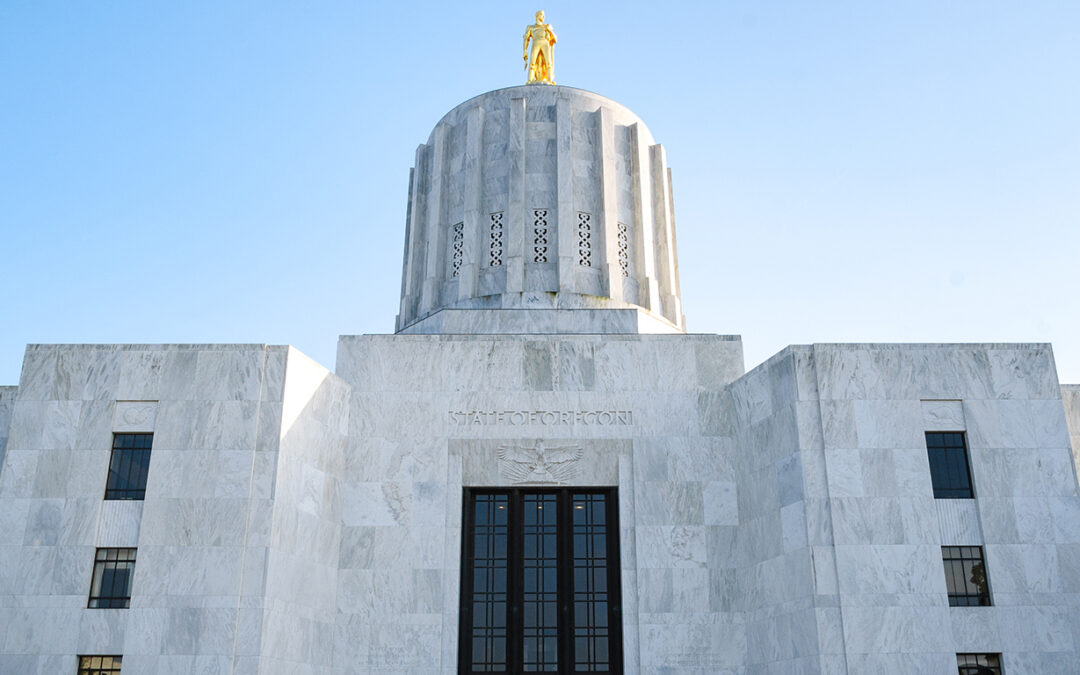
Apr 27, 2023 | AOC Business Partner
Regional Solutions Visits Gilliam County
The Regional Solutions staff in the governor’s office convenes together once a month to think big about the program, share notes on problem solving, and appreciate the context of our colleagues’ work. Our plan is to periodically hold these gatherings in the field to connect to local communities and see the practical applications of our work. We were very grateful to Gilliam County for hosting us for the first of these field meetings during the Kotek Administration. The team had the opportunity to tour the Columbia Ridge Landfill—the largest landfill west of the Mississippi River—and the Chemical Waste Management Site near Arlington. The Waste Management staff also shared plans to create a renewable natural gas facility with carbon capture technology that will use gas byproduct from the landfill to create energy and limit greenhouse gas emissions. The team discussed Waste Management’s long history and engagement with the county, including recent partnership with the county to help address housing shortages for Waste Management’s workforce. Many thanks to the Waste Management team for their hospitality.
Over lunch, the team also had the chance to catch up with Port of Arlington Director Jed Crowther, who updated us on key initiatives within the county. Director Crowther shared updates on the many projects that the county, port, and other partners are engaged in, including the rehabilitation of the Condon Elementary School for housing and other community uses (utilizing Brownfields funds from Business Oregon), a plan by the Port to create shovel ready land in Arlington for further residential development, and collaborative efforts to create more affordable childcare opportunities. On all of these fronts, the county continues to make critical and large investments. The Regional Solutions team is engaged in many of these efforts, and Nate Stice and Courtney Crowell, who share coverage for Gilliam County, were able to share context on several projects.
Again, a big thank you to Director Crowther for joining us for a rich discussion, and to Gilliam County and Judge Liz Farrar Campbell for allowing the use of their facilities.
Greater Eastern and Northeast Regions
- City of Echo Pedestrian Safety Bridge: Within the city of Echo there are two sets of railroad tracks that cut through the community, with one of the tracks becoming a parking lot for trains in the area. Unfortunately, the Echo school is right near the tracks and the nearest pedestrian crossing is almost a half mile down the road, so many times kids end up crossing the tracks and when there are trains parked there, they can’t see and it becomes a huge safety concern. The Oregon Department of Transportation (ODOT) has partnered with the city to put $2.5 million towards planning and design of a safety solution. Representative Bobby Levy (R-Echo) is requesting $4 million to create a pedestrian bridge that would run from the school, over both sets of train tracks to the other part of town. Regional Solutions will continue to follow this issue and help with either the implementation of the pedestrian bridge or looking for other solutions.
- Umatilla Basin Water Quantity Issues: Regional Solutions brought together the Oregon Water Resources Department (OWRD), the Port of Umatilla and the Mid-Columbia Water Commission to discuss concerns related to an instream lease of the Port of Umatilla being used for mitigation by the Mid-Columbia Water Commission in order to use water out of the Columbia River for irrigation. Regional Solutions is working to improve communication and find a path forward for this year’s mitigation efforts. Both OWRD and the Mid-Columbia Water Commission are working on finding solutions over the next few days to solve this issue in the short-term.
- Confederated Tribes of the Umatilla Indian Reservation/City of Pendleton Transportation Planning: Regional Solutions and ODOT convened a meeting between the city of Pendleton and the Confederated Tribes of the Umatilla Indian Reservation (CTUIR) to discuss the large-scale transportation projects surrounding exits 209 and 216 and Highway 331. For the past few years both CTUIR and the city of Pendleton have individually applied for federal funding through the Rebuilding American Infrastructure and Sustainability Equity (RAISE) grant program and haven’t been successful. The city of Pendleton is trying once again with matching assistance from ODOT but should they prove not successful this year, we are beginning to have conversations about how the three entities (CTUIR, city of Pendleton and ODOT) might be able to coordinate together to make a joint application for a larger and more comprehensive regional transportation project. Not only are their freight issues in this region but there is significant safety concerns associated with this larger project. The hope is that by working together we might have a better shot at the federal funding. RS will continue to help strengthen the working relationship and see if there are ways to work together over the next year.
- Baker City Wastewater Project: Regional Solutions met with both the Department of Environmental Quality (DEQ) and Baker City recently to discuss their ongoing challenges with their wastewater treatment project. The good news is that DEQ has put out for public comment the city’s Recycled Water Plan which, once approved, will allow the city to land apply their wastewater on land approved by DEQ. This public comment period will last for 30 days and if the city feels they are close to overflowing their lagoons, DEQ has said they will approve a special use permit within 48 hours to allow the city to land apply wastewater. We also discussed what DEQ will need to allow additional land to be brought into land application (medium term solution) and the city is working on providing that information. Regional Solutions will continue to bring the city and DEQ together monthly to discuss next steps and ensure that communication is going smoothly.
- Verde Light Community Solar Project: Regional Solutions has been working for the past couple of weeks with a community solar project in Ontario that is running into regulatory challenges between state agencies. This is a small solar project that has received a $900,000 Oregon Department of Energy (ODOE) grant and is about to receive a $1 million United States Department of Agriculture (USDA) grant to provide solar for the city of Ontario. The land is zoned heavy industrial and was planned to be a truck stop prior to this community solar project. This project has gone through the National Environmental Policy Act (NEPA) to account for federal environmental needs, and the land has been deemed not a wetland by the U.S. Army Corps of Engineers. However, the state has determined that the land includes a wetland and there are regulatory challenges between the Department of State Lands (DSL) and DEQ to issuing a final permit. Regional Solutions is working with DEQ and DSL to try and find a path forward for this project.
North Central and North Coast Regions
- Dog River Pipeline: The City of The Dalles has engaged the Regional Solutions Team over the last several years on a project to replace 3.5 miles of aging wooden water supply pipeline that serves as the main water supply for the city. The former pipeline leaked nearly a million gallons a day. The project is designed to create more resilient infrastructure for the community as well as supporting environmental values as well. In particular, the pipeline will include new fish passage and screening systems at the pipeline intake. The project includes a $1 million investment from the Oregon Water Resources Department and financing from Business Oregon.
- Update: The team continues to work with the city through the permitting and construction of the
project and met with the city this week to help navigate part of the process.
- Childcare Center Project: Regional Solutions has been participating in an effort to house a new childcare center in The Dalles. The project is led by the Columbia Gorge Education Service District and Columbia Gorge Community College Child Care Resource and Referral. Regional Solutions helped the college to secure a legislative allocation to move the project forward. The project group has spent the last year looking at economic models, partnerships, and potential locations, and have identified an underutilized school district property as a potential site for the project: the Chenowith Middle School site.
- Update: Regional Solutions team members rejoined the project steering committee and received an update on engineering and cost estimates for rehabilitation of the site. The middle school will require significant investments to put it into service as a childcare center. The team will work with the Educational Service District (ESD) and college to explore funding option both for repair of the property and ongoing operations.
- City of St. Helens: The City of St. Helens has undertaken a comprehensive look at redeveloping their downtown waterfront district. Of particular interest are brownfield sites where Boise Veneer and Boise White Paper were once located. Three key waterfront properties totaling over 250 acres that provide catalytic redevelopment opportunities for
the city. The city plans to restore the connection between downtown St. Helens and the Columbia River, provide public access to the waterfront, and preserve the natural and cultural heritage of St. Helens.
- Update: Thanks to the City of St. Helens for taking the time to get me up to speed on the project and share the many other amazing efforts under way in the community.
South Coast & Southern Oregon Regions:
- Roseburg Forest Products announced on Friday a suite of planned investments in Southern Oregon totaling $700 million over the next four years. These investments include the creation of two new, state-of-the-art factories at the company’s Dillard, Oregon complex. The new Dillard Medium Density Fiberboard (MDF) plant will make MDF and High Density Fiberboard (HDF) panels, and the planned Dillard Components facility will convert specialty MDF made at the company’s Medford, Oregon plant into Armorite™ Trim, a new exterior trim product developed by Roseburg Forest Products. Both new plants are anticipated to begin operations in 2025 and will employ approximately 120 people once completed. In addition to these new plants, Roseburg intends to invest $200 million into modernizing its plants in Riddle and Coquille. The Regional Solutions ream worked hard to help encourage this investment: after working with the company to understand their business needs, which included funding and regulatory certainty, Business Oregon awarded a grant of $3 million from the Emerging Opportunity Fund to help purchase machinery for the $45 million Dillard Components plant, while the Department of Environmental Quality’s Air Quality team provided technical assistance around air quality permit application preparation and timing.
Resources
Workforce Ready Grants Available:
The Oregon Higher Education Coordinating Commission (HECC) has opened the Request for Applications (RFA) for Workforce Ready Grants, Round Two: Innovation in Workforce Programs to support the education and training needs of Oregonians through Future Ready Oregon.
Future Ready Oregon is a comprehensive $200 million investment package that supports the education and training Oregonians need for good-paying jobs, prioritizing underserved and historically marginalized communities. You can learn more about Future Ready Oregon on the HECC Future Ready Oregon webpage. Workforce Ready Grants are the largest component of Future Ready Oregon and will be available on a phased or rolling basis through 2024. In round one, the HECC released $10 million in capacity-building grants to broaden the type and number of organizations that comprise Oregon’s workforce system.
The second round focuses on innovative and collaborative workforce development programming and partnerships that center the needs of Oregon’s historically underserved communities. Up to $35 million may be awarded to develop education and training programs that connect individuals to the resources they need for good-paying jobs and meaningful careers. Investments will advance opportunities to recruit and retain a diverse workforce in key sectors of Oregon’s economy— healthcare, manufacturing, and technology.
Who is Eligible
The HECC welcomes applications from community-based organizations and workforce service providers that administer workforce programs in the healthcare, manufacturing, or technology sectors and prioritize equitable program participation by individuals from priority populations.
How to Apply
The RFA document—which details eligible activities, timelines, guidelines, and requirements for applications—can be found on HECC’s Grants and Contracts webpage. The RFA has been posted in both English and Spanish and can be made available in additional languages upon request. The application deadline is June 23, 2023.
Support for Applicants
Potential applicants have access to technical assistance providers who can help them understand the terms and requirements of the RFA, as well as provide feedback on application materials, free of charge. Contact information for technical assistance providers is included in the RFA.
Additionally, HECC will host four virtual information sessions. These sessions are free, and participation is optional but encouraged.
- Session 1, Monday, April 17, 1-2 p.m.
- Session 2, Tuesday, April 25, 4-5 p.m.
- Session 3, Wednesday, May 3, 1–2 p.m.
- Session 4, Wednesday, May 10, 4:30–5:30 p.m.
Once you have registered, you will receive an email with the meeting link. Please email FutureReadyOregon@hecc.oregon.gov if you do not receive the link, or if you have additional questions.
Contributed by: Regional Solutions

Mar 24, 2023 | AOC News
AOC, your membership organization, has been hard at work this last quarter. We’ve been able to navigate some complex policy discussions; build and strengthen partnerships; and officially opened the doors to our new building to celebrate this achievement at our March open house.
While not a full review of our activities, below are some highlights for us as an organization this last quarter.
Legislative Session – Policy
Members and staff have been actively testifying and lobbying legislators on critical issues facing our counties. While we are nearing the end of the first chamber deadlines this session, we have already seen the bill list narrow – as a reminder, long sessions see anywhere from 3,000 – 4,000 bills introduced.
March 17 was the first deadline. By this date, bills that had not been posted for a work session are presumed dead. April 4, is the next deadline. Bills that have not been moved out of a policy committee in their chamber of origin to either the other chamber, or a joint committee will be added to that list, further narrowing bills of focus for the Legislature.
The AOC legislative affairs team has put together the initial list of high-level bills they are tracking, calling out which survived the first deadline and which did not. Click here to view this list.
As a reminder, while we are working hard to move AOC supported bills, it’s not as simple as a bill dying at the deadline. Some policy issues do resurface through “gut and stuffs”, amendments, the budget, new bill introductions, or may be further explored in work groups.
Sine die is the official call of what makes it and what does not, but deadlines help narrow the scope of focus on legislation.
Legislative Session – Budget
In addition to policy discussions, the Legislature is diving deeply into creation of the state’s 2023-25 budget.
Over the next few weeks, the Joint Committee on Ways and Means will be conducting its biennial “road show,” where they will take their budget framework, released March 23, by the powerful budget committee co chairs, and seek feedback from Oregonians.
The committee will visit the following four cities for public input:
- Portland (April 8);
- Newport (April 14);
- Roseburg (April 21); and
- Ontario (April 28).
More information is available here.
AOC would encourage our members to connect with legislators on the committee and provide testimony on key funding for county programs.
If you have any questions please feel free to contact me or any member of our legislative affairs team.
Open House
On March 13, AOC officially opened its doors to members, partners, and stakeholders to celebrate our new building. Our building, purchased in November of 2021, is now equipped with furniture, audio visual equipment, and is well organized to support the needs of our organization, day-to-day operations, members, and any events we may host at the building.
I was delighted to see so many members and partners drop by to see our new space and network.
Partnerships
I am pleased to say AOC is building strong relationships with the governor’s office, her staff, and agency partners. I am meeting with the governor’s office to build relationships and elevate our membership needs. Staff on your legislative affairs team are regularly meeting with the governor’s staff and agency staff to advocate for our issues. This is important work, and a high priority for AOC as a new administration means new staff, new direction, and new opportunities for collaboration.
Looking Forward
We look forward to closing out the legislative session with some wins for our members.
If you have any questions, please feel free to reach out.
Gina Firman Nikkel, Ph.D.
AOC Executive Director

Mar 23, 2023 | AOC Advocacy
The first chamber deadline on March 17 for a work session to be posted rendered many of this session’s introduced bills officially dead. The next deadline on April 4 for a bill to have had a work session will weed out even more. Below is a short list of AOC priority bills by portfolio and how they stand as of the March 17 deadline. Whether you are inclined to rejoice or despair, it is important to remember that there are various ways a supposedly ‘dead’ concept can be resurrected.
Governance, Revenue, & Veterans
Alive
SB 877 Staggered terms for County Commissioners
The Senate Committee on Rules voted unanimously on March 14 to pass SB 877 with an amendment clarifying if a commissioner is filling a vacancy in either the primary or the general election that term would be for two years.
HB 2490 Cybersecurity Public Records Exemption
The House Committee on Emergency Management, General Government, and Veterans passed HB 2490 unanimously on March 16.
HB 2806 Cybersecurity Executive Session
The House Committee on Emergency Management, General Government, and Veterans committee passed HB 2806 unanimously on March 14.
SB 417 and Other Public Records Bills
On Feb. 6, the AOC Legislative Committee adopted directions for AOC contract lobbyist, Anna Braun, to engage in public records bill discussions. Counties must be able to recoup their costs and requests for public records should not be frivolous. Contract lobbyist, Anna Braun, is a member of the workgroup on the public records bills. The workgroup is continuing to meet weekly.
SB 848 Duty to Defend
AOC voted on March 13 to oppose this bill and AOC contract lobbyist, Anna Braun, testified against the bill at the public hearing. The bill has been the subject of a workgroup led by committee chair, Senator Floyd Prozanski (D-Eugene). The bill is scheduled for a work session on March 29.
Dead
HB 2055 Streamlining the Procurement Process
The AOC legislative committee voted to support this bill on Jan. 6. This bill had a hearing on Feb. 1 in the House Committee on Business and Labor and had no opposition. Unfortunately, the Department of Administrative Services (DAS) and the Department of Justice (DOJ) had questions about the bill and it was never posted for a work session. AOC is asking the chair of the committee for an interim workgroup on procurement issues.
SB 850 Project Labor Agreements
AOC voted on March 13 to oppose this bill.
Health & Human Services
Alive
HB 2543 Community Behavioral Health Cost Study
Requires the Oregon Health Authority to conduct a study every four years of funding needed by community mental health programs in complying with statutory requirements and post a report of findings to the authority’s website.
HB 2395 Opioid Harm Reduction Package
Allows specified persons to distribute and administer short-acting opioid antagonist and distribute kits, streamlines youth overdose death reporting. The bill also updates outdated statutory language.
HB 2773 Local Public Health Workforce Development
Requires Oregon Health Authority to provide incentives to increase recruitment and retention of local public health professionals.
SB 624 Certified Community Behavioral Health Clinic Program
Establishes a certified community behavioral health clinic program in the Oregon Health Authority.
SB 319 Indemnification of Counties, Providers for Community Aid and Assist Services
Provides that a person who contracts with a public body to provide services for purposes of community restoration or to restore fitness to proceed is a state officer, employee, or agent for purposes of indemnification under Oregon Tort Claims Act under certain circumstances.
SB 470 State/Federal Coverage of Youth in Detention
Prohibits the denial of medical assistance on the basis that an individual under 19 years of age is in detention pending adjudication.
HB 2651 Extension of Behavioral Health Workforce Recruitment/Retention Funding
Appropriates moneys from the state General Fund to the Oregon Health Authority to be used for specified purposes related to expanding behavioral health provider workforce.
HB 2977 Behavioral Health Workforce Development
Requires the Higher Education Coordinating Commission, in collaboration with the Oregon Health Authority, to establish a grant program for the purpose of distributing moneys to institutions of higher education to develop programs that prepare students to enter into the behavioral health workforce.
HB 2463 Reducing Administrative Burden
Requires the Oregon Health Authority to convene two work groups to study statutory and regulatory framework for behavioral health systems and make recommendations to reduce administrative burdens on behavioral health care providers and increase system efficiencies.
HB 2544 Funding for Behavioral Health Residential Treatment Facilities
Appropriates moneys from the General Fund to the Oregon Health Authority for costs related to increasing statewide capacity of licensed residential facilities serving individuals with substance use disorders or mental health concerns.
HB 2405 Fitness to Proceed
Requires that the court dismissing charges due to defendant lacking fitness to proceed also order transport of defendant back to jurisdiction in which charges were initiated.
HB 2506 Supersiting of Residential Treatment and Supported Housing
Expands the definition of “residential homes” and “residential facilities” that local governments must approve under the same standards as other residential uses.
HB 2001 Emergency Homeless Response Omnibus
Expedites the disbursement of funds set aside for communities in the federal “Balance of State” counties.
HB 5019 Funding for Emergency Homeless Response Omnibus
Dead
SB 219 Implementation of Debra Pinals Report Recommendations
AOC Legislative Committee voted to support this bill with amendments. Those amendments did not come to fruition and the bill was allowed to die in favor of ongoing discussion with stakeholders and legislative leadership.
HB 2431 State/Federal Coverage of Adults in Jail
AOC Legislative Committee voted to support this bill after its first and only public hearing. Prohibits the termination of medical assistance for a person who is residing in a correctional facility in pretrial detention pending adjudication.
HB 2448 Reclassification I/DD Case Managers
The needed remedy in this bill was achieved administratively with the Department of Administrative Services and the Oregon Health Authority, so while the bill is dead, this is a victory for community developmental disabilities programs for staff recruitment and retention as it will begin to accurately set the pay scale based on the current scope of work for program staff after a couple of decades of neglect.
HB 2652 Emergency Fund for Local Health Staff
The AOC Legislative Committee voted to support this bill after its first and only public hearing. Authorizes a county to declare shortage of healthcare and human services personnel and apply to the Oregon Health Authority for moneys to make grants to employers to alleviate shortage by offering certain benefits to potential workers and educators.
Natural Resources
Alive
HB 2527 Habitat Conservation and Management Plan
Modifies several provisions of the wildlife habitat special assessment program related to conservation and management plan approval, monitoring, and compliance. AOC supported the bill as drafted.
HB 3021 Water Right Forfeiture Exemption if Owner Engaged in Conservation Practices
AOC supported the bill as drafted.
SB 718 Water Right Forfeiture Exemption if Governor Declared a Drought in Area
This bill provides that a year in which the governor declares that drought exists or is likely to exist within a county does not count toward the five-year water right forfeiture time period. AOC supported the bill as drafted.
HB 2687 A Native American Tribe Noxious Weed Applicator License
This bill allows for tribal employees to obtain an applicator license to address noxious weeds on and adjacent to reservation land. AOC was in support with amendments.
SB 471 Wolf Depredation Funding
This bill would allocate additional funding, $800,000, to the wolf depredation fund that county programs administer. AOC supports the bill as drafted.
HB 3163 Place-Based Planning
This bill would establish a permanent place-based planning process and ensure the program does not sunset on July 1. AOC was in support with forthcoming amendments from Representative Mark Owens (R-Crane).
HB 3368 Responsible Water Accounting Legislation
AOC took a support and seek amendments position to this bill at its most recent meeting. HB 3368, as drafted, is undergoing significant rewrites, however, the portion of the bill that will remain consists of having the Oregon Water Resources Department conduct a study of all groundwater in the water basins in Oregon and discover which areas have been over appropriated and fully appropriated. AOC is working with the bill sponsor to ensure counties’ concerns are addressed in the forthcoming amendment.
SB 644 Rural Accessory Dwelling Unit (ADU) Decoupled from Wildfire Risk Map
This bill would allow a county to issue and site an ADU in zoned rural areas of a county. The current statute ties this ability to the wildfire risk map being operational. AOC supported the bill with the -4 amendments.
Dead
HB 2940 Counties Take Specific Actions in Wildland Urban Interface (WUI) to Prevent Wildfires
AOC was opposed to the bill unless amended. The reason was due to the potential fiscal impact that would occur if passed. This bill would require counties to remove any vegetation or tree in county land adjacent to the WUI and build roads to act as fire break lines.
SB 90 State Forest Task Force on Long-Term Management
AOC was opposed to the bill unless amended. The bill would have created a task force to look at long-term state forest management, however, counties were not included in the bill drafting, nor in the base bill make up.
SB 795 Counties to Re-acquire State Forest Lands
AOC was in support of the concept to give the state forest land back to the counties if the counties believed they could better achieve “greatest permanent value.” This bill received a courtesy hearing but was not advanced.
HB 2547 Additional Funding for Wildlife Services
This bill would have increased the statutory dollar allocation from $60,000 to $400,000 – the amount it has received in previous biennial expenditure allocations. AOC was in support of this bill as drafted. It is possible this bill is alive though the final appropriations bill of the session.
SB 199 Rulemaking by Oregon Fish and Wildlife on Predatory Animals
SB 199 would give all rulemaking authority on how the taking of predatory animals could occur to the Oregon Department of Fish and Wildlife. This bill would have impacts on county vector control as well as how county employees could go about addressing issues of rodents or animals in buildings and causing problems for docks and wharfs. AOC opposed the bill, unless amended.
Public Safety
Alive
HB 2308 District Attorney Salaries
Eliminating the lower salary for district attorneys in less populous counties has been scheduled for a public hearing March 21 and a work session March 29.
HB 2391 Crime Victim Assistance Programs
Providing state funding for crime victim assistance programs has been scheduled for a public hearing March 21 and a work session March 28.
HB 2054 Adding District Attorneys to the Police and Fire Public Employee Retirement System
The bill had its first hearing on Feb. 28.
HB 2467 Public Defenders Student Loan Assistance
Establishing a student loan repayment assistance plan for public defenders has been scheduled for a public hearing March 29 and a work session April 3.
HB 2645 Penalties for Fentanyl Possession
Increasing penalties for possession of five or more fentanyl pills has been scheduled for a work session March 23.
SB 766 Modifying the Illegal Marijuana Market Enforcement Grant program
The bill was moved out of the Senate Committee on Judiciary by unanimous vote. It now moves to the Joint Committee on Ways and Means.
HB 3581 Courthouse Expansion
Columbia County’s bill allows for Article XI-Q bonds to be used for courthouse expansion projects.
SB 962 Emergency Preparedness Coordinators
Creating a grant program to help counties hire emergency preparedness coordinators. The bill has been scheduled for a hearing on March 23 and a work session on March 30.
SB 953 State Medical Examiner’s Office Service to Counties
SB 953 potentially allows the State Medical Examiner’s Office to shift their work and costs onto counties without providing any funding to support the work. The bill is scheduled for a public hearing on March 20 and a work session March 28.
HB 2732 Continuing Funding for Childrens’ Advocacy Centers
Dead
HB 2311 Raising Salaries for District Attorneys
SB 779 Requiring Law Enforcement Officers to Obtain Post-Secondary Education
SB 781 Reassigning Local Law Enforcement
Allows the governor to reassign local law enforcement officers in case of heightened danger or unrest.
HB 2392 Storage of Body Camera Footage
Appropriates money to the Department of Justice for distribution to district attorneys to pay for review and storage of body camera footage.
HB 2394 Prison Medical Care Study
Directs the Department of Corrections to study ways to improve medical care for incarcerated adults.
HB 2123 Giving County Board of Commissioners Authority to Appoint County District Attorney in Case of Vacancy
HB 2134 Directing Department of Public Safety Standards and Training to Establish Training Program for Deputy District Attorneys.
HB 2212 Including 9-1-1 Operators in Police and Fire Public Employee Retirement System Program
HB 2948 County Fairgrounds Improvements
Providing grants for infrastructure improvements to county fairgrounds that are designated emergency evacuation points.
SB 302 Psilocybin and Cannabis Production
Requiring producers of psilocybin and cannabis to show proof of landlord permission before being granted permission to produce these products legally.
SB 762 Creating Crime of Controlled Substance Homicide
HB 2854 Grants for Disaster Response
HB 2852 Disaster Mitigation and Recovery Managers
Grants for counties to hire disaster mitigation and recovery managers.
HB 2848 Community Based Organization Networks for Emergency Response
Directs Oregon Department of Emergency Management to establish a program for fostering networks of community organizations to help with emergency prevention, preparedness, response, and recovery.
Transportation and Community Development
Alive
HB 3201 Maximizing Oregon’s Share of Federal Broadband Infrastructure Funding
Passed out of the House Committee on Economic Development and Small Business on March 16. It will now head to the House floor for a vote.
HB 3414 Local Land Use Variances
Requires local governments to approve variances that allow developers to violate local housing regulations unrelated to health, safety, habitability, and certain other subjects within urban growth boundaries.
HB 3174 Land Use and Construction Permitting
Local capacity bill providing state funding for additional local government staff to process permits and land use decisions and eliminate delays in construction permitting.
SB 847 Omnibus Housing Bill
Freezing assessed value of newly constructed middle housing for five years, limiting the Land Use Board of Appeals review of middle housing development, providing for supersiting of homeless shelters, and including several other provisions.
HB 2510 and SB 451 Remove the Cap on Transfers to the County Fair Account so that the Account Receives One Percent of Lottery Proceeds.
Both have been moved out of their policy committees and into the Joint Committee on Ways and Means, though HB 2510 was amended to redirect a portion of the money to horseracing.
HB 2727 Childcare Facility Siting
Creating a workgroup to study barriers to childcare facility siting. The bill received a work session on March 20 and was voted out of committee.
HB 3197 Rural Land Use
Eliminating the requirement that development regulations applying to land outside urban growth boundaries be clear and objective, has been posted for a hearing on March 28 and a work session March 30.
HB 3220 Modernizing the E-Cycles Program
This program for electronic waste that often includes hazardous materials, was moved out of committee on March 16 on a partisan vote. It heads straight to the House floor.
SB 835 Allowing ADUs to Share a Septic System
The bill allows ADUs to share a septic system with a single family dwelling. SB 835 has been posted for a work session on March 20.
SB 885 Broadband for Libraries
Helping libraries go after federal grants for broadband infrastructure, has been scheduled for a public hearing and possible work session on March 30.
Dead
HB 2207 Limits Appeals of Local Land Use Decisions
Limiting standing in appeals of local government land use decisions to those living or working within 25 miles of the local government.
HB 2766 Barriers to Broadband Study
Requiring the broadband office to study barriers to placement of broadband access points.
HB 3249 Telecommunications Broadband Bill
Reforms broadband improvement grant programs.
SB 930 Housing Project Appeals
Providing that when local governments’ approval of a needed housing project is appealed and the local governments’ decision is affirmed, attorneys fees for the prevailing applicant would be paid by appellant.
Contributed by:
Anna Braun | AOC Contract Lobbyist
Michael Burdick | Legislative Affairs Manager
Jessica Pratt | Legislative Affairs Manager
Branden Pursinger | Legislative Affairs Manager









